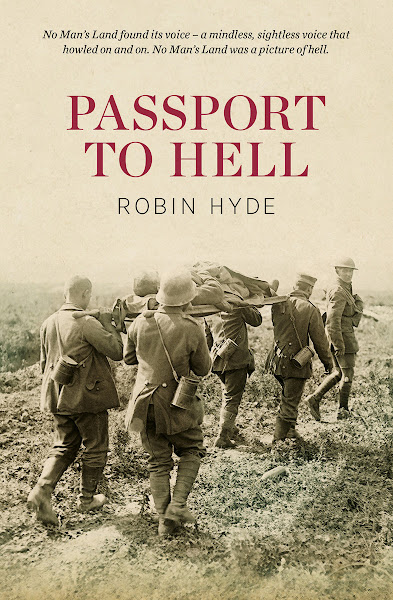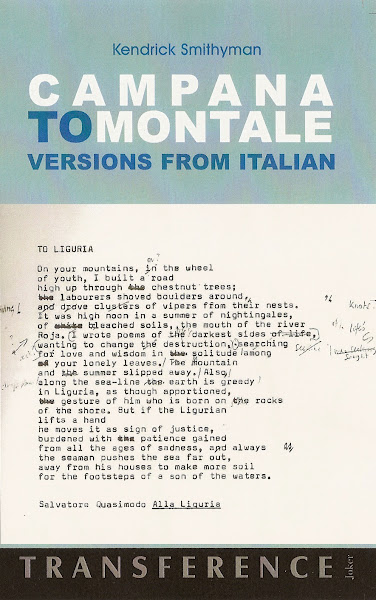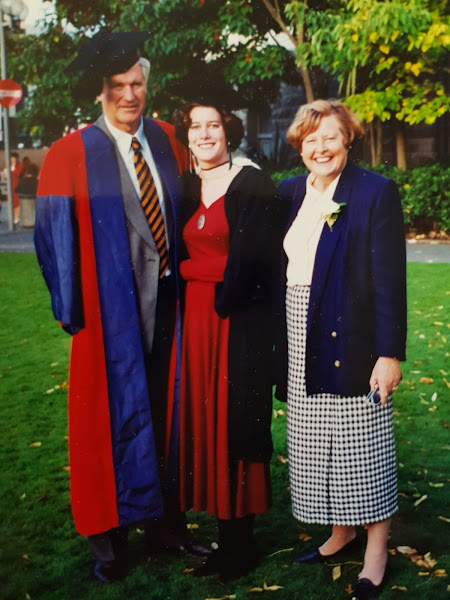Bill Direen's latest poetry collection includes poems about 100-odd films which have enthused him - or at any rate attracted his attention - over the years.
There are definitely some rhymes there with my own filmocopia (to coin a term) - though perhaps more with directors than specific films. I too am a Jan Švankmajer devotee; Fritz Lang, Lars von Trier, Jean Vigo: the landmarks are all there.
Here are a few quotes from his book (one for each of the above):
Death
who lives in celluloid,
and is tired of witnessing suffering,
and of feeding off that
of which men are capable.
- 'Destiny'
[after Fritz Lang, Der müde Tod (1921)]
In memory of his murdered father
the filmaker raises a punkster flag
against dictator midgets on thrones
preening themselves in mirrors
- 'Zero for Conduct'
[after Jean Vigo, Zéro de Conduite (1933)]
The beginning is pain.
A professional slaps your rear faces.
A sailor suit dances a pretty dance.
Perseverance is your only name
- 'Jabberwocky'
[after Jan Švankmajer, Žvahlav aneb šatičky slaměného Huberta (1971)]
Shame, that happiness should exist
for you to debase.
Shame, that my great love must kill
what yours lacked greatness to save.
- 'Medea'
[after Lars von Trier, Medea (1988)]
I note, too, the presence of Alain Corneau's resplendent Tous le matins du monde (1991) and Paul Schrader's fascinating Mishima (1985), as well as such classics as Hitchcock's The Birds (1963), Fred Wilcocks' Forbidden Planet (1956) and Murnau's Nosferatu (1922).
As a kind of tribute to Direen's audacious project, rather than simply discussing his myriad choices - not all of which I'm familar with, in any case - I thought I might riposte with my own "top 100" movies, spread out chronologically over the past century of film.
You'll note, as you scroll down, that I've made up a few rules for myself:
- Each director gets one film each - or else I could have easily filled up the tally with the likes of Hitchcock, Kubrick, or John Ford without ever straying into more esoteric regions.
- They're arranged alphabetically, by director's surname, within each year, without worrying about exactly when they were released (since such things are staggered around the world, there doesn't seem much point in being too over-precise there).
- Nor have I entered into the - otherwise vital - question of who is the actual 'author' of a film? The director or the screenwriter? Or (for that matter) a combination of both, together with cinematographer, designer, composer, producer(s), etc.? I tend towards the last hypothesis myself, but it's probably a discussion for another day.
I decided early on that if you're not being honest you might as well not bother. I like Jimmy Stewart, whether he's playing straight or serious. Sue me. I'm not a fan of teen movies in general, but I do have a weakness for The Breakfast Club. I don't know why, but the fact remains. Maybe you had to be there. I love ghost stories, Sci-fi, and heroic war movies. All of the above are well represented here.
•
My Own Century of Cinema:
•
- D. W. Griffith, dir. Intolerance (1916)
- Robert Wiene, dir. The Cabinet of Dr. Caligari (1920)
- Abel Gance, dir. Napoléon (1927)
- Fritz Lang, dir. Metropolis (1927)
- James Whale, dir. Frankenstein (1931)
- Jean Renoir, dir. La Grande Illusion (1937)
- Alfred Hitchcock, dir. The Lady Vanishes (1938)
- Frank Capra, dir. Mr Smith Goes to Washington (1939)
- Victor Fleming, dir. The Wizard of Oz (1939)
- John Ford, dir. Young Mr Lincoln (1939)
- Charlie Chaplin, dir. The Great Dictator (1940)
- Walt Disney, dir. Pinocchio (1940)
- Orson Welles, dir. Citizen Kane (1941)
- Sam Wood, dir. For Whom the Bell Tolls (1943)
- Sergei Eisenstein, dir. Ivan the Terrible (1944)
- Roberto Rossellini, dir. Rome, Open City (1945)
- John Huston, dir. The Treasure of the Sierra Madre (1948)
- Carol Reed, dir. The Third Man (1949)
- Henry Koster, dir. Harvey (1950)
- Akira Kurosawa, dir. Rashomon (1950)
- Elia Kazan, dir. A Streetcar Named Desire (1951)
- Billy Wilder, dir. Ace in the Hole (1951)
- Vittorio De Sica, dir. Umberto D. (1952)
- Henri-Georges Clouzot, dir. The Wages of Fear (1953)
- Cecil B. De Mille, dir. The Ten Commandments (1956)
- Alexander Mackendrick, dir. Sweet Smell of Success (1957)
- J. Lee Thompson, dir. Ice Cold in Alex (1958)
- John Sturges, dir. The Magnificent Seven (1960)
- David Lean, dir. Doctor Zhivago (1965)
- Michelangelo Antonioni, dir. Blow-Up (1966)
- Sergio Leone, dir. Once Upon a Time in the West (1968)
- Henry Hathaway, dir. True Grit (1969)
- Nicolas Roeg, dir. Walkabout (1971)
- Bob Fosse, dir. Cabaret (1972)
- Werner Herzog, dir. Aguirre, the Wrath of God (1972)
- Víctor Erice, dir. The Spirit of the Beehive (1973)
- Pier Paolo Pasolini, dir. Arabian Nights (1974)
- Roger Donaldson, dir. Sleeping Dogs (1977)
- Hal Ashby, dir. Being There (1979)
- Andrei Tarkovsky, dir. Stalker (1979)
- Stanley Kubrick, dir. The Shining (1980)
- Ridley Scott, dir. Blade Runner (1981)
- Paul Schrader, dir. Cat People (1982)
- Philip Kaufman, dir. The Right Stuff (1983)
- Miloš Forman, dir. Amadeus (1984)
- David Lynch, dir. Dune (1984)
- Peter Bogdanovich, dir. Mask (1985)
- John Hughes, dir. The Breakfast Club (1985)
- Peter Masterson, dir. The Trip to Bountiful (1985)
- Geoff Murphy, dir. The Quiet Earth (1985)
- Rob Reiner, dir. Stand by Me (1986)
- Bruce Robinson, dir. Withnail and I (1987)
- Terry Gilliam, dir. The Adventures of Baron Munchausen (1988)
- Jan Švankmajer, dir. Alice (1988)
- Denys Arcand, dir. Jesus of Montreal (1989)
- Peter Brook, dir. The Mahabharata (1989)
- Joe Dante, dir. The 'Burbs (1989)
- Bernardo Bertolucci, dir. The Sheltering Sky (1990)
- Anthony Minghella, dir. Truly, Madly, Deeply (1990)
- Bruce Beresford, dir. Black Robe (1991)
- Joel & Ethan Coen, dir. Barton Fink (1991)
- David Cronenberg, dir. Naked Lunch (1991)
- Lars von Trier, dir. Zentropa (1991)
- Francis Ford Coppola,, dir. Bram Stoker’s Dracula (1992)
- Clint Eastwood, dir. Unforgiven (1992)
- Harold Ramis, dir. Groundhog Day (1993)
- Tim Burton, dir. Ed Wood (1994)
- Mel Gibson, dir. Braveheart (1995)
- Christopher Hampton, dir. Carrington (1995)
- Ron Howard, dir. Apollo 13 (1995)
- James L. Brooks, dir. As Good as It Gets (1995)
- Atom Egoyan, dir. The Sweet Hereafter (1997)
- Charles Sturridge, dir. FairyTale: A True Story (1997)
- Terrence Malick, dir. The Thin Red Line (1998)
- Curtis Hanson, dir. Wonder Boys (2000)
- Wolfgang Petersen, dir. The Perfect Storm (2000)
- Alejandro Amenábar, dir. The Others (2001)
- Hayao Miyazaki, dir. Spirited Away (2001)
- Irwin Winkler, dir. Life as a House (2001)
- Spike Jonze, dir. Adaptation (2002)
- Phillip Noyce, dir. Rabbit-Proof Fence (2002)
- Mark Pellington, dir. The Mothman Prophecies (2002)
- Martin Scorsese, dir. Gangs of New York (2002)
- Greg Page, dir. The Locals (2003)
- Roland Emmerich, dir. The Day After Tomorrow (2004)
- Michel Gondry, dir. Eternal Sunshine of the Spotless Mind (2004)
- Ken Burns, dir. Unforgivable Blackness (2005)
- Joss Whedon, dir. Serenity (2005)
- Christophe Gans, dir. Silent Hill (2006)
- Clayton Jacobson, dir. Kenny (2006)
- Joel Anderson, dir. Lake Mungo (2008)
- Jane Campion, dir. Bright Star (2009)
- Zack Snyder, dir. Watchmen (2009)
- Emilio Estevez, dir. The Way (2010)
- Debra Granik, dir. Winter’s Bone (2010)
- Steven Spielberg, dir. Lincoln (2012)
- Ben Stiller, dir. The Secret Life of Walter Mitty (2013)
- Doug Lyman, dir. Edge of Tomorrow (2014)
- Ryusuke Hamaguchi, dir. Drive My Car (2021)
- Christopher Nolan, dir. Oppenheimer (2023)
•
I note a strange preponderance of rabbits in the above: Harvey, the invisible six-foot rabbit, who befriends Elwood P. Dowd in the 1950 Jimmy Stewart film of the same name; that creepy white rabbit, with his stuffing leaking out, in Jan Švankmajer's 1988 version of Alice; above all, those heroic little girls setting off to make their way back home in Rabbit-Proof Fence ...
More to the point, there were quite a few films that didn't make the final cut. I would have loved to include one of the Marvel Avengers movies: Infinity War (2018) or Endgame (2019), perhaps. But much though I enjoyed them, it was hard to persuade myself that they were actually very good movies, despite a few intensely stirring setpieces: "Avengers - assemble!"
Gregory Jacobs's brilliant thriller Wind Chill (2007) should have been in there. So should Jean Vigo's classic L'Atalante (1934). So should Cy Enfield's Zulu (1964). I'd have also liked to have included a Sergei Bondarchuk film: perhaps Waterloo (1970) rather than the more self-consciously epic War and Peace.
And then there was the wonderful James Baldwin documentary below. Perhaps that could be my no 101, in fact. It certainly deserves it.
Raoul Peck, dir. I Am Not Your Negro (2016)
So thanks again for the wonderful idea, Bill. I can't claim to have interpreted it in quite the same way that you did, but I doubt if I would have taken the trouble if it hadn't been for your fascinating collection of poems.
•





















































































































